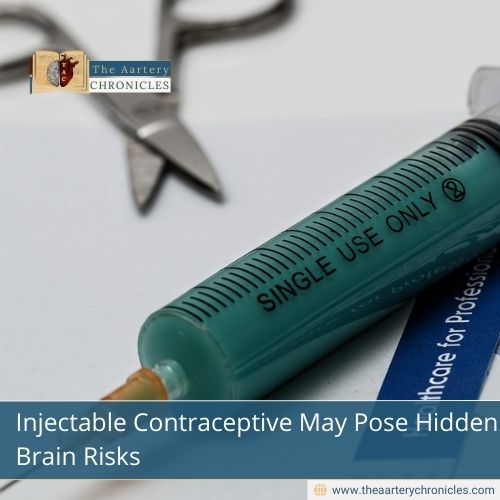

Injectable Contraceptive May Pose Hidden Brain Risks
A new large-scale study has found that prolonged use of an injectable contraceptive tied to brain tumour diagnoses may be a serious concern for women, particularly when the contraceptive is used for several years or started later in adulthood. The findings come from researchers at Case Western Reserve University School of Medicine and the Cleveland Clinic and were recently published in JAMA Neurology.
What Are Meningiomas?
Meningiomas are non-cancerous tumours that develop in the membranes surrounding the brain and spinal cord. They make up around 40% of all primary brain tumours diagnosed in the United States and occur more often in women. Scientists have long suspected that hormones may play a role, since many meningiomas show progesterone receptors and, in some cases, estrogen receptors.
The Contraceptive in Focus
Depot medroxyprogesterone acetate (dMPA) is a long-acting injectable contraceptive also prescribed for heavy menstrual bleeding and endometriosis. Earlier studies from France and U.S. insurance data hinted at a possible connection between this injection and meningioma risk. The new research provides stronger evidence of this link.
How the Study Was Conducted
Researchers analysed data from TriNetX, a U.S. network of 68 healthcare organisations, covering records from December 2004 to December 2024. Out of more than 61 million women reviewed, over 10 million met the study criteria for comparing contraceptive use with health outcomes.
The study compared different groups, including:
- Control group (8.1 million women)
- Depot medroxyprogesterone acetate users (88,668)
- Oral medroxyprogesterone acetate users (736,443)
- Women using combined oral contraceptives, IUDs, progestin-only pills, or subdermal implants
Key Findings
The results showed a significant increase in risk for women who used injectable depot medroxyprogesterone acetate:
- Overall risk: Women using dMPA had a 143% higher chance of being diagnosed with meningioma compared to non-users.
- Duration of use: Risk climbed with time, 200% higher after 4–6 years of use, and 290% higher after more than 6 years.
- Age at first use: Starting injections later in life carried a 277% higher risk 277% higher if started at ages 31–40, 175% higher at ages 41–50, and 220% higher after age 50.
In comparison, oral medroxyprogesterone acetate carried only an 18% increased risk.
Other Contraceptives Show No Increased Risk
Interestingly, no higher risk was found among women using combined oral contraceptives, intrauterine devices (IUDs), progestin-only pills, or subdermal implants. In fact, some options even appeared protective:
- Combined oral contraceptives: 26% lower risk
- All IUDs combined: 13% lower risk
- 52 mg levonorgestrel IUD: 21% lower risk
What This Means for Women
The study highlights that prolonged use of injectable contraceptives tied to brain tumour diagnoses is most concerning when the treatment is used for many years or started after age 31. While meningiomas are typically non-cancerous and slow-growing, their presence can still cause significant health issues and often requires surgery.
Other contraceptive methods, including oral pills, hormonal and copper IUDs, and implants, did not show the same elevated risks and may even reduce the likelihood of meningioma.
Conclusion
Researchers conclude that women considering or currently using depot medroxyprogesterone acetate injections should be aware of the potential long-term risks, especially with extended use or later initiation. Healthcare providers may want to discuss alternative contraceptive options for women at higher risk.
This study underscores the importance of individualised contraceptive counselling and ongoing research into how hormone-based medications influence women’s brain health.
Source: Inputs from various media Sources
I’m a pharmacist with a strong background in health sciences. I hold a BSc from Delhi University and a pharmacy degree from PDM University. I write articles and daily health news while interviewing doctors to bring you the latest insights. In my free time, you’ll find me at the gym or lost in a sci-fi novel.
- Priya Bairagi
- Health News and Updates,People Forum
- 5 September 2025
- 22:00








